人教新课标选修六Unit 2 Poems单元复习课件(87张ppt)
文档属性
| 名称 | 人教新课标选修六Unit 2 Poems单元复习课件(87张ppt) |
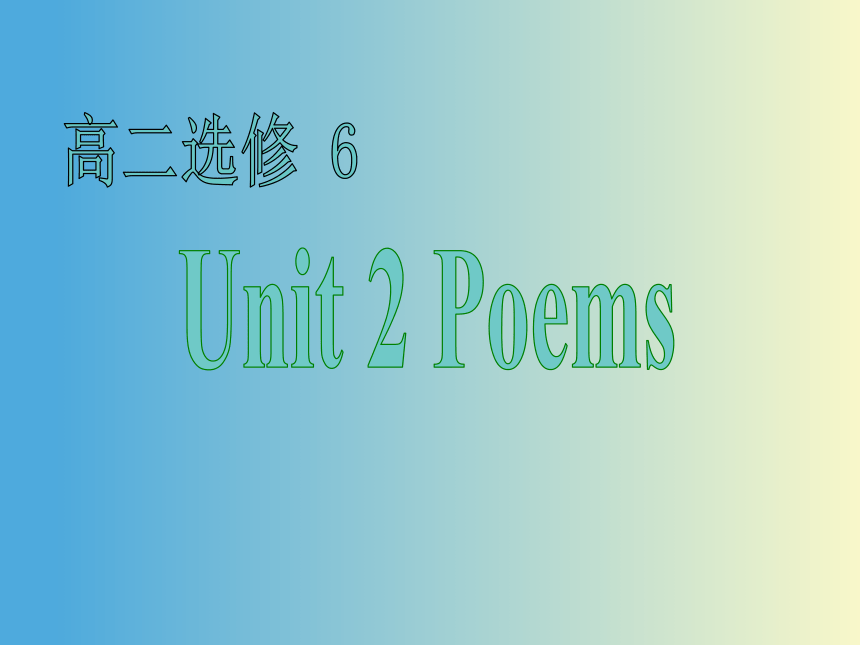
|
|
| 格式 | zip | ||
| 文件大小 | 1.1MB | ||
| 资源类型 | 教案 | ||
| 版本资源 | 人教版(新课程标准) | ||
| 科目 | 英语 | ||
| 更新时间 | 2022-02-22 16:24:10 | ||
图片预览

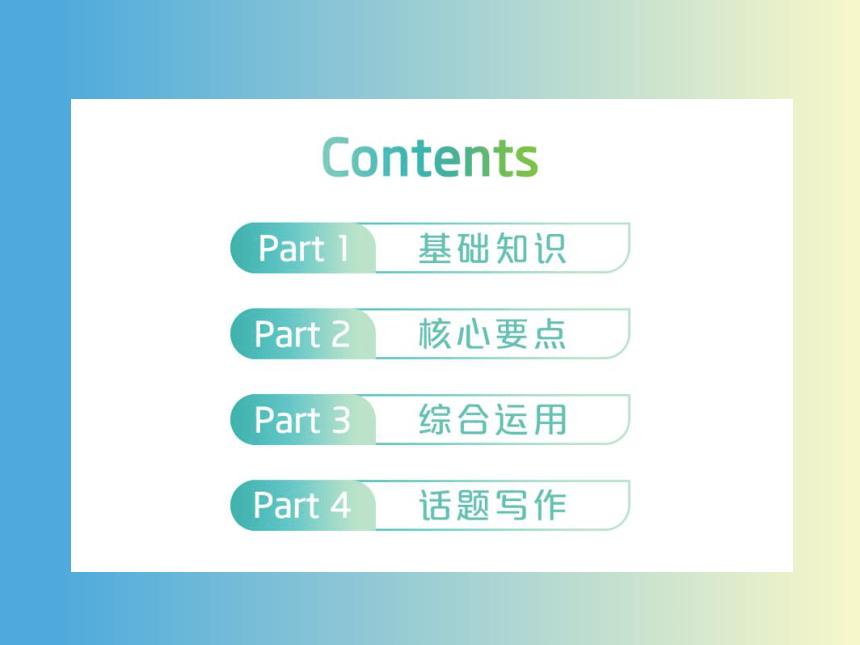
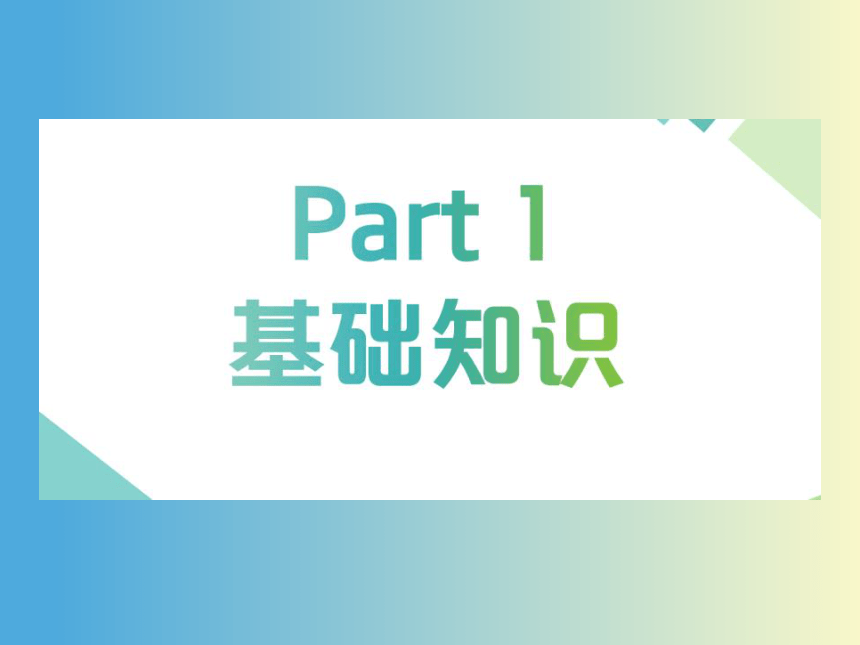
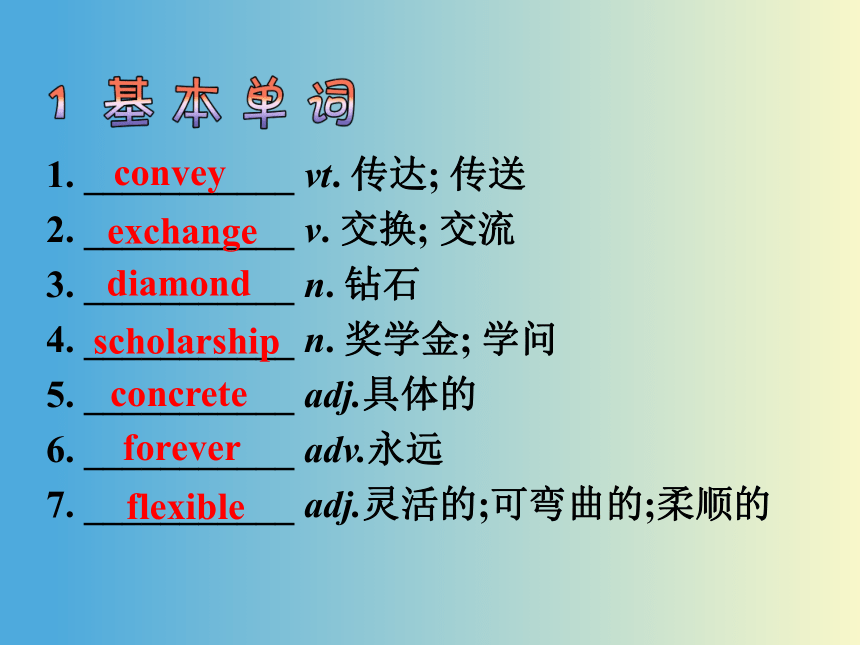
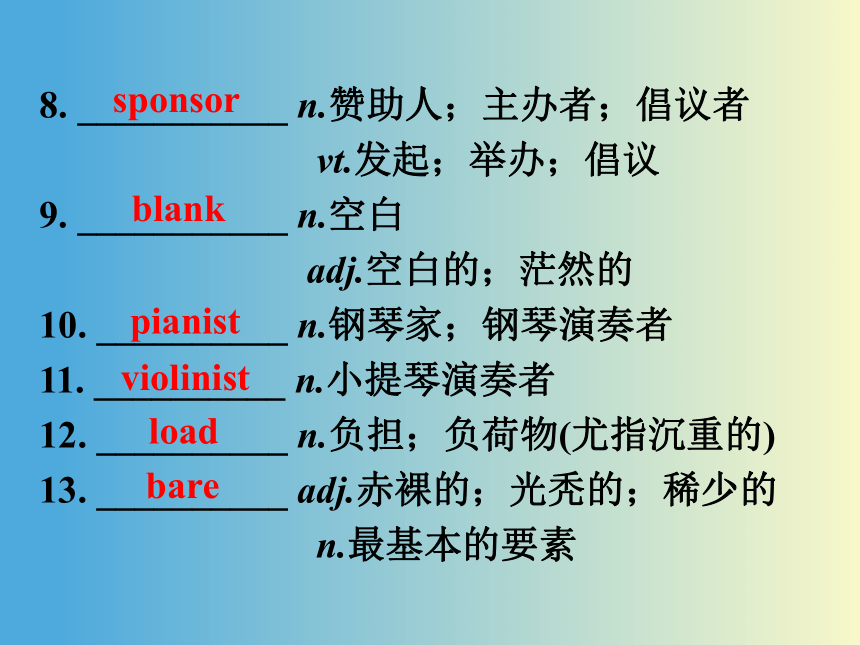
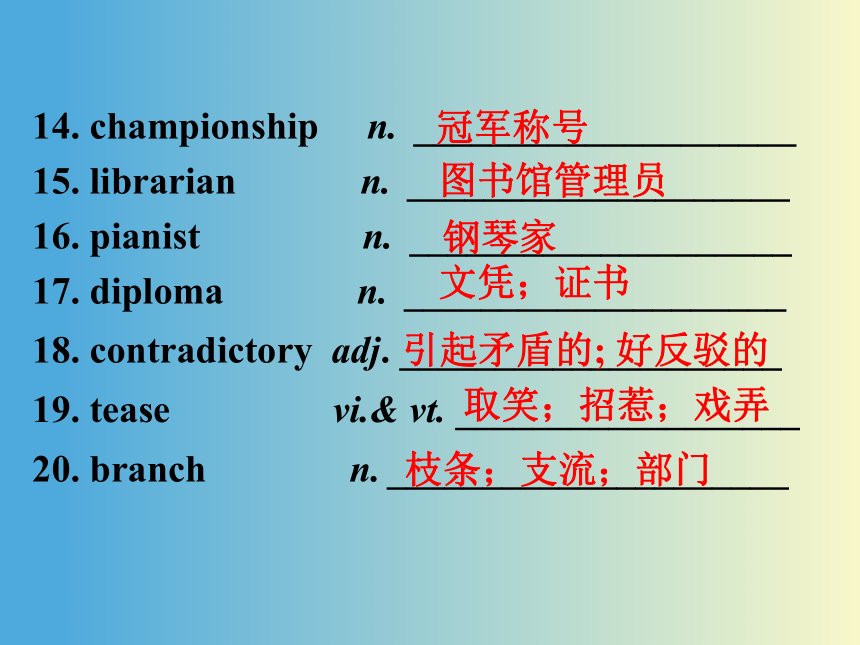
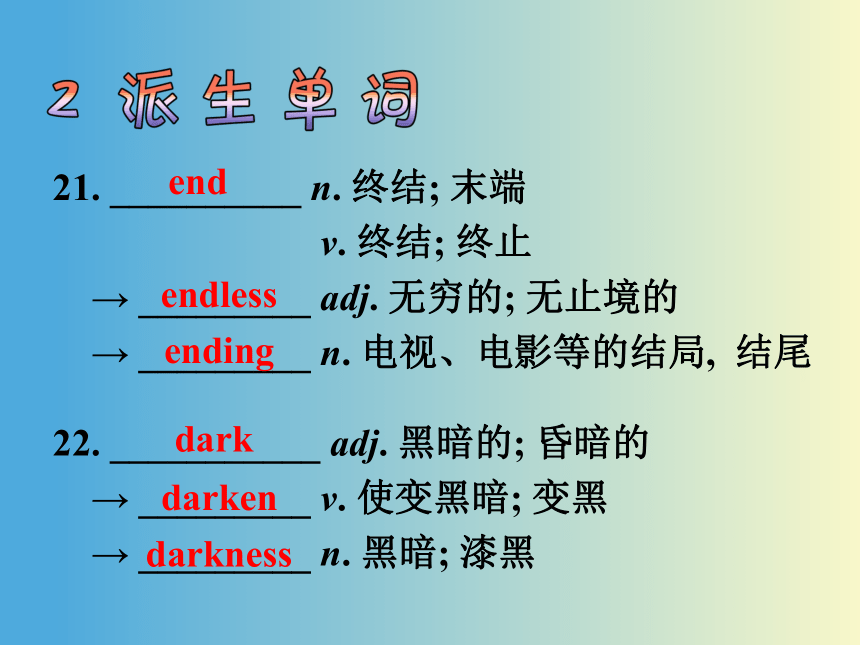
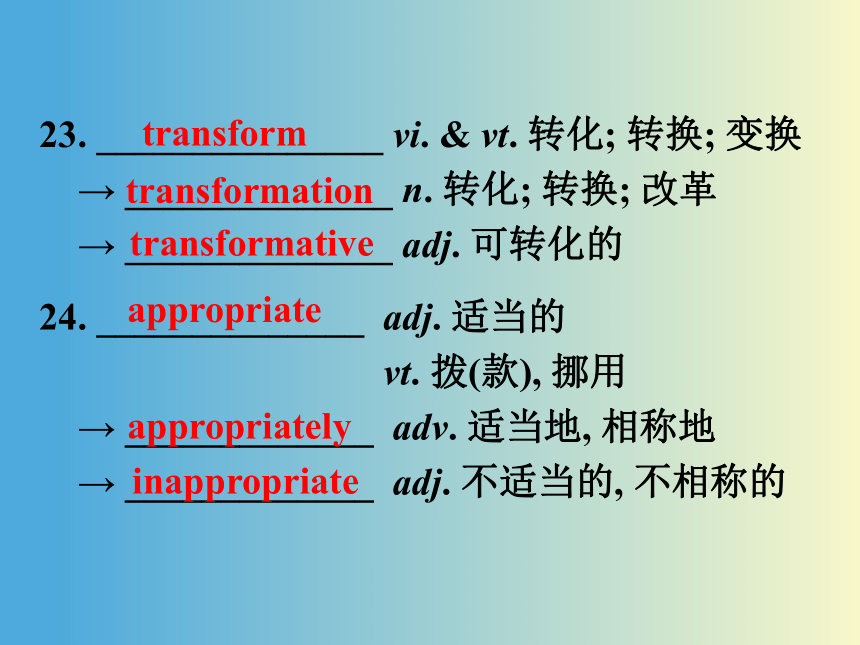
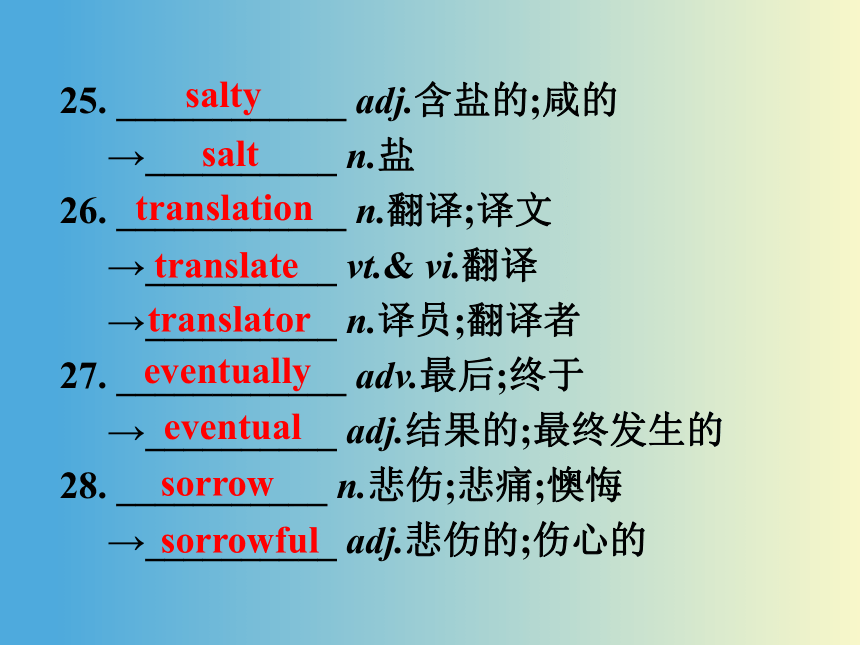
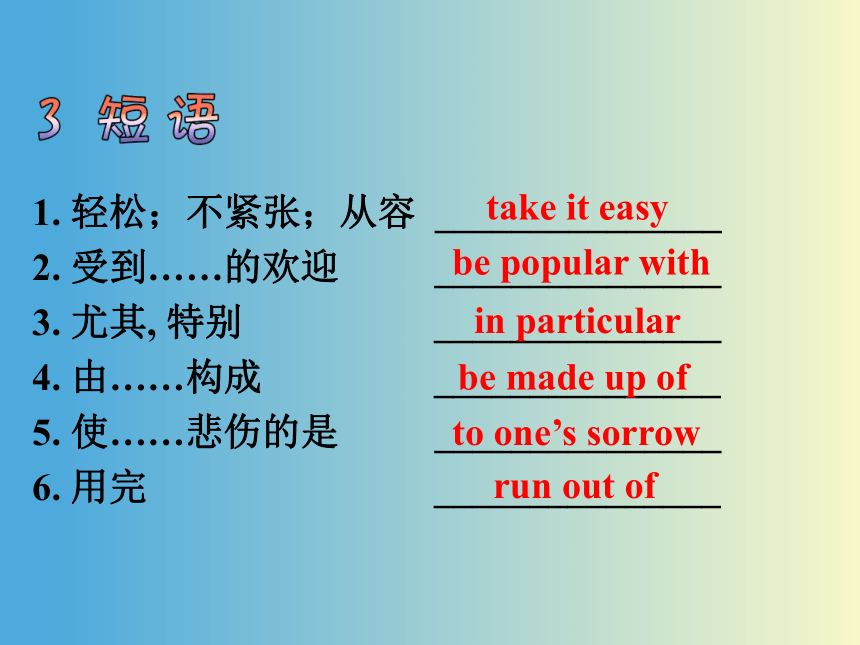


文档简介
(共87张PPT)
Unit 2 Poems
高二选修 6
1. ___________ vt. 传达; 传送
2. ___________ v. 交换; 交流
3. ___________ n. 钻石
4. ___________ n. 奖学金; 学问
5. ___________ adj.具体的
6. ___________ adv.永远
7. ___________ adj.灵活的;可弯曲的;柔顺的
convey
exchange
diamond
scholarship
concrete
forever
flexible
8. ___________ n.赞助人;主办者;倡议者
vt.发起;举办;倡议
9. ___________ n.空白
adj.空白的;茫然的
10. __________ n.钢琴家;钢琴演奏者
11. __________ n.小提琴演奏者
12. __________ n.负担;负荷物(尤指沉重的)
13. __________ adj.赤裸的;光秃的;稀少的
n.最基本的要素
sponsor
blank
pianist
violinist
load
bare
14. championship n. ____________________
15. librarian n. ____________________
16. pianist n. ____________________
17. diploma n. ____________________
18. contradictory adj. ____________________
19. tease vi.& vt. __________________
20. branch n. _____________________
冠军称号
图书馆管理员
钢琴家
文凭;证书
引起矛盾的; 好反驳的
取笑;招惹;戏弄
枝条;支流;部门
21. __________ n. 终结; 末端
v. 终结; 终止
→ _________ adj. 无穷的; 无止境的
→ _________ n. 电视、电影等的结局, 结尾
ending
endless
end
22. ___________ adj. 黑暗的; 昏暗的
→ _________ v. 使变黑暗; 变黑
→ _________ n. 黑暗; 漆黑
darken
darkness
dark
23. _______________ vi. & vt. 转化; 转换; 变换
→ ______________ n. 转化; 转换; 改革
→ ______________ adj. 可转化的
transformation
transformative
transform
24. ______________ adj. 适当的
vt. 拨(款), 挪用
→ _____________ adv. 适当地, 相称地
→ _____________ adj. 不适当的, 不相称的
appropriately
inappropriate
appropriate
25. ____________ adj.含盐的;咸的
→__________ n.盐
26. ____________ n.翻译;译文
→__________ vt.& vi.翻译
→__________ n.译员;翻译者
27. ____________ adv.最后;终于
→__________ adj.结果的;最终发生的
28. ___________ n.悲伤;悲痛;懊悔
→__________ adj.悲伤的;伤心的
salty
salt
translation
translate
translator
eventually
eventual
sorrow
sorrowful
1. 轻松;不紧张;从容 _______________
2. 受到……的欢迎 _______________
3. 尤其, 特别 _______________
4. 由……构成 _______________
5. 使……悲伤的是 _______________
6. 用完 _______________
take it easy
be popular with
in particular
be made up of
to one’s sorrow
run out of
7. 把……转化成 ___________________
8. 把……译成 ___________________
9. convey ... to ... ___________________
10. day by day ___________________
11. try out ___________________
12. let out ___________________
transform ... into ...
translate ... into ...
向……表达
一天天, 逐渐
试验, 试用
发出, 放走
With so many different forms of poetry to choose from, students may eventually want to write poems of their own.
“with+宾语+宾语补足语”为with 复合结构,可位于句首或句尾,常做时间、原因、方式、伴随状语,亦可做后置定语。
-ship结尾的名词
scholarship 奖学金
friendship 友谊
leadership 领导地位
relationship 关系
hardship 苦难
membership 成员资格
取笑与愚弄
tease 取笑;戏弄
laugh at 嘲笑
make fun of 取笑
make a fool of 愚弄
play a trick on 捉弄
play jokes on 戏弄
Tang poetry 唐诗 poetic language 诗歌语言
romantic poetry 浪漫诗歌
be reflected in his poems 反映在他的诗里
write a poem about how I feel
把我的感受写成一首诗
The Book of Songs is the earliest existing collection of Chinese poems and songs.
《诗经》是现存最早的中国诗歌总集。
诗歌
Poetry often follows special patterns of rhythm and rhyme.
诗歌常常遵循专门的节奏和押韵格式。
The style and atmosphere in their poems often led to comparison with poets such as ....
他们的诗作的风格和氛围常常使人把他们与……等诗人相提并论。
Poetry calls up all the colors, feelings, experiences and curious images of a dream world.
诗歌能唤起梦幻世界的一切色彩、感情、经历和各种奇特的意象。
convey vt. 运送; 传达; 转达, 表达
【教材原句】Others try to convey certain emotions. 有些诗是为了传达某种感情。
【归纳】
convey sth. to sb. 向某人表达/传递某物
convey sb./sth. from A to B
把某人或某物从A地运送到B地
convey one’s feelings/meanings/message
表达某人的感情/意思/信息
【语境应用】完成句子。
1) If you see James, do convey my apologies _______ him.
2) Could you convey a message to Mr Merrick _______ me, please
3) Pipes convey hot water _______ the boiler to the radiators.
4) Peter showed me that what matters is how you _______ (传递) your own passion so that you excite other people. (2019天津)
to
for
from
convey
翻译句子。
1) 言辞无法表达我内心的喜悦。
2) 戴维向我父亲表达了他的祝愿。
3) 这些货物通常用直升飞机运送。
Words cannot convey how delighted I was.
David conveyed his good wishes to my father.
The goods are usually conveyed by helicopter.
2. transform v. 转换, 改造, 改变; 改变, 变换, 转化
【教材原句】Never looking back, transformed into stone.
化为石, 不回头。
【归纳】
transform ... into ... 把……变成……
transform sb. / sth. from ...
把某人/物从……中转变
【拓展】
transformation n. 变化, 转变
transformable adj. 可变形的, 可变化的
transformer n. 变压器
【联想】trans-前缀
transplant 移植
transmit 传送,传播
【语境应用】完成句子。
1) Well, you’ve certainly ______________ this place — it looks great!
2) It’s said that the shape of such a toy is _____________.
3) His attitude to life has gone through a(n) ______________.
4) Anyone who expects a source of power in the _____________ (transform) of these atoms is talking moonshine. (2017北京)
transformed
transformable
transformation
transformation
3. bare vt. 使赤裸; 露出; 透露;揭开,脱掉
adj. 赤裸的, 裸露的;光秃秃的,不长东
西的;无遮盖的; (柜子等)空
的;最基本的,最简单的
n. 最基本的要素
【教材原句】The forms I liked best conveyed their meaning by using the bare minimum of
words.
我最喜欢的形式就是言简意赅。
【拓展】
the bare bones of the story 故事梗概
with your bare hands 赤手空拳
the bare facts 不加渲染的事实真相
lay sth. bare 暴露, 揭露
bare your soul to sb.
(向某人)打开心扉, 倾述衷肠
【语境应用】给出bare相符合的释义。
1) The trees soon gave way to bare rock.
2) Don’t walk around outside in your bare feet.
3) The room had the bare minimum of furniture.
4) His fridge was bare apart from three tomatoes.
5) There's no carpet in the room, just bare floorboards.
光秃秃的
裸露的
最基本的,最简单的
空的
无遮盖的,没有保护的
翻译句子。
1) The walls were bare except for a clock.
2) Peter did the bare minimum of work but still passed the exam.
3) The room was cold and bare.
墙上除了一只挂钟什么也没有。
彼得只花了最少的工夫, 却仍然通过了考试。
这个房间很冷, 而且空无一物。
4. exchange n. 交换; 交流; 互换;对话, 兑换;
汇兑
vt. & vi. 调换; 交换
【教材原句】If there had not been an exchange programme, he would not have found a sponsor to help him study abroad.
如果以前没有这个交换项目, 他不会找
到资助人赞助他去留学。
【归纳】
make an exchange 交换
in exchange (for) (以……)交换
exchange … for / with… 用……交换……
exchange sth. with sb. 和某人交换某物
exchange A for B 用A交换B
exchange of ideas / information
意见/信息的交流
【语境应用】完成句子。
1) 用我的旧电视机换这架照相机, 你愿意吗?
Would you like my old TV ________________ this camera
2) 我们就这件事情交换一下意见吧。
Let’s have a(n) __________________ on the matter.
in exchange for
exchange of views
3) 我和你调一下座位好吗
May I _______________________
4) 你可以在宾馆把你的钱兑换成美元。
You can ________________________ _______ in the hotel.
5) So information was ________ (交换), but it wasn’t a true, intentional back and forth.
(2017全国Ⅱ)
exchange seats with you
exchange your money for
dollars
exchange
5. blank n. 空白(记忆中的)空白,遗忘
adj. 空白的;茫然的
【教材原句】Fill in the blanks using the correct forms of the verbs in brackets.
【拓展】
blank cheque 空白支票
blank out 遮盖;刻意忘记,抹去记忆
【语境应用】完成句子。
1) 她翻到笔记本的一张空白页。
She ____________________ in her notebook.
2) 如果你回答不了问题,就空着它。
If you can’t answer the question, ____________.
3) 她试图把那些可怕的经历从记忆中抹去。
She _______________ the terrible experiences.
4) A wide smile emerged from his ______ (茫然的) expression.
turned to a blank page
tried to blank out
leave a blank
blank
6. load n. 负荷; 装载量; 重担
v. 装载; 使担负; 装填; 装货; 装料; 装弹药
【教材原句】
Slowly the old man carries his load.
老人慢慢地挑起担子。
【归纳】
loads of / a load of 大量, 许多
take a load off one’s mind
卸下心中重担, 如释重负
load sth. / sb. with sth. 用……装载……
load sth. into /onto sb. / sth.
把……装入 (到)……
load down 使负担过重
load up 装载货物
【拓展】
overload vt. 使超载, 使负荷过重
【语境应用】翻译句子。
1) 我们还有一大堆的问题要解决。
2) 给货车装货花了他们一个小时。
We still have loads of / a load of problems to solve.
It took them an hour to load the van.
1. take it easy 轻松; 不紧张; 从容
【教材原句】if we hadn’t taken it easy…
如果我们没有放松警惕……
take...for granted 认为……理所当然
take...as ... 把……当作……
take...for ... 把……误认为……
take one’s time 不慌不忙, 不急于, 慢慢来
【拓展】
take sth. seriously
重视某事, 对某事严肃对待
【语境应用】完成句子。
1) Her parents were always there and she just ____________________.
她的父母随时都出现在她身边,她却认为他们理应如此。
2) _____________; we have got plenty of time.
别着急,我们时间很充裕。
took them for granted
Take it easy
2. run out of 用完(某物)
及物动词短语, 主语为表示人的名词或代词。
run out (某物)用完, 耗尽
不及物动词短语, 主语为表示时间、食物、金钱等的名词。
【教材原句】
… if we hadn’t run out of energy.
…… 如果我们没有筋疲力尽。
【拓展】
use up 用完,用光,耗尽,后跟宾语,有被动形式
give out 用完,筋疲力尽,常物作主语,无被动形式。
【语境应用】用run out/run out of完成句子。
1) We’d just reached the motorway when the petrol __________.
2) The car ___________ gas three miles from the town, so we had to walk.
3) Tony decided it would be best to go home before he ___________ money.
4) If they _________ (用光;用尽) certain daily necessities, Wilson will drive to the nearest store and purchase what’s needed. (2019北京)
ran out
ran out of
ran out of
run out of
3. be made up of 由……组成或构成
【教材原句】
Another simple form of poem that students can easily write is the cinquain, a poem made up of five line.
另外一种学生容易写的简体诗是由五行组成的, 叫做五行诗。
【辨析】
be made up of =consist of(无被动语态, 不用于进行时), 这两个短语的主语通常为整体。
make up组成, 构成。主语常为组成整体的各个部分。
【语境应用】完成句子。
1) The audience at yesterday’s meeting __________________________ twelve leaders from some big companies.
2) Women __________ 56% of the student numbers in the university.
was made up of / consisted of
make up
4. in particular 特别; 尤其; 格外
(= particularly/especially)
【教材原句】Did you know that English speakers also enjoy other forms of Asian poetry -- Tang poems from China in particular
你知道吗 说英语的人也喜欢其他类型的亚洲诗, 尤其是中国的唐诗。
【拓展】
particular adj. 特指的, 特别的; 讲究, 挑剔
be particular about 对……挑剔/讲究
【联想】含in短语
in theory 理论上, 从理论上来说
in practice 实际上, 在实践中
in advance 提前
in common 共同的
in danger 处于危险中
in general 一般来说
in harmony 和谐
in public 公开地
in total 总共
【语境应用】完成句子。
1) They chat about nothing _____________.
2) The old man was knocked down by a motorbike. He was _____________.
3) ___________, 36 people lost their lives in the train crash.
4) You should prepare ____________ for this English competition.
5) There was one poem ___________ (特别) that’s stayed in my memory. (2019天津)
in particular
in danger
In total
in advance
in particular
5. try out 测试;试验
【教材原句】I think I’ll try out his way too some time. 我想我下次也会试试他的方法。
【拓展】try短语
try for 设法争取(得到)
try on 试穿(衣服)
try one’s best 尽力, 竭尽全能
try one’s fortune / luck 碰运气
try to do sth. 尽力/努力去做某事
【语境应用】完成句子。
1) He said he was going to __________ first place next year.
2) The director is ___________ some actors for the new play.
3) I think you should ____________ to improve your English.
try for
trying out
try your best
6. let out 发出(叫声);放走;加宽, 放
长(衣服);泄露;出租
【教材原句】Slowly the blackbird lets out a cry.
慢慢地乌鸦发出叫声。
【拓展】
let on 泄露; 假装
let go 放开; 释放; 发射
let up 停止; 放松; 减少
【语境应用】翻译句子。
1) Jack accidentally let out that he hadn’t been home for three weeks.
2) The boy let out a cry of pain.
3) The doctor is letting her out of hospital next week.
杰克无意中泄露他已经三个星期没有回家了。
那个男孩大声喊痛。
医生打算下周让她出院。
With so many different forms of poetry to choose from, students may eventually want to write poems of their own.
有这么多不同的诗歌类型可供选择,学生们最终也许想自己写诗了。
With so many different forms of poetry to choose from为with的复合结构做状语。
其结构如下:
(1) with+宾语+doing(表示主动、进行)
(2) with+宾语+done(表示被动、完成)
(3) with+宾语+to do(表示将来的动作)
(4) with+宾语+介词短语/adj./adv.
with的复合结构亦可做后置定语。
【语境应用】完成句子。
1) I turned around and saw a woman
________________________.
我转过身,看见一位脸上露着灿烂的笑容妇女。
2) You’ll need a warm place with perfect soil _________ (grow) it.
你需要一个温暖的土壤肥沃的地方来种植它。
with a big smile on her face
to grow
3) Body language can give away a lot about your mood, so standing with your arms __________ (fold) can send out a signal that you are being defensive.
肢体语言能够泄露你的很多情绪,因此双臂交叉站着能发出你正在防卫的信号。
4) More than 750,000 have graduated from SAC, with many __________________ (找工作) in engineering, aviation, education, medicine and a wide variety of other professions. (2018北京)
folded
seeking employment
虚拟语气(二)
虚拟语气在if条件从句中表示过去情况的用法表示与过去事实相反时, 从句的谓语用过去完成时had +过去分词, 主句的谓语用would /should /could /might + have +过去分词。
e.g. If the film had won an Oscar, it would / should / could / might have become famous right away.
If Eric had gone to college, he would / should/ could/ might have become an engineer.
虚拟语气在其它从句中的用法:
1. 在would rather后的宾语从句中, 谓语常用一般过去时表示现在或将来的情况, 用过去完成时表示过去的情况。
e.g. I would rather James called me today.
I would rather Michael visited us this
Sunday.
I would rather Mr. Black had told me
the truth yesterday.
2. 在表命令、要求、建议等的名词性从句中, 谓语用should+动词原形或只用动词原形。
e.g. Mr. Brown ordered that we (should) set off at once.
It is requested that an agreement (should) be reached between the two sides.
The doctor’s suggestion is that my mother (should) stay in bed for another three days.
3. as if, as though引导的状语从句中, 谓语用一般过去时表示现在的情况, 用过去完成时表示过去的情况。
e.g. The old woman loved Tony as if /
though he were her son.
Bob talks about France as if / though
he had been there himself.
4. 在It’s (high) time (that) ...句型中, 从句谓语要用虚拟语气(多用一般过去时)。
e.g. It’s time that we were taught a lesson.
It’s high time that you made up your
mind.
【拓展】特殊的虚拟条件句
1. 错综时间条件句:条件句主句谓语和从句谓语表示的动作在时间上并不一致。如:
If Monica had studied hard at that time, she would be a college student now.
If I were you, I would have gone to the cinema yesterday.
2. 含蓄条件句:虚拟的条件有时可以不用条件从句来表示, 而是通过某些词或短语来表达。常用来表示含蓄虚拟条件的词或短语有or, without, but for (要不是)等。如:
Without the message, Frank would not have found the lost computer.
But for your help yesterday, I couldn’t have solved the problem.
【语境应用】用动词的正确形式填空。
1) I _____________________________________
(crash) the car but for your warning.
2) I demand that John ________ (go) there at
once.
3) It’s high time we ________ (stop) treating
him like a child.
4) If only I _____ (know) her phone number!
Then I could call her right now.
5) Tom says he’s coming to see me tomorrow.
I’d rather he ________ (come) today.
should go
stopped
would / should / might / could have crashed
knew
came
6) What do you think of the suggestion that
houses __________ (be) built on this site
7) What I did was right and if I ________ (do)
anything less, the machine wouldn’t be
working now.
8) I have to go to the post office in this heavy
rain. If only he ________________
(remember) to send that letter yesterday!
(should) be
had done
had remembered
用括号内动词的正确形式填空。
1) If the weather ________ (be) better, we could have had a picnic. But it rained all day.
2) If we ________ (take) the other road, we might have arrived here in time for the meeting.
3) —John went to the hospital alone.
—If he ________ (tell) me about it, I would have gone with him.
had been
had taken
had told
4) —The weather has been very hot and dry.
—Yes. All my vegetables have died. If it had rained even a drop, they ________________ ___________________(survive).
5) If my car ________ (be) more reliable, I would have driven to Lhasa instead of flying last summer.
would/could/should/
had been
might have survived
2. What a pity! You missed the sightseeing, or we _____ a good time together. (2019江苏)
A. had B. will have
C. would have had D. had had
C
1. The workers were not better organized, otherwise they _____ the task in half the time. (2019天津)
A. accomplished
B. had accomplished
C. would accomplish
D. would have accomplished
D
3. It’s strange that he ________ have taken the books without the owner’s permission. (2018江苏)
4. There is a good social life in the village, and I wish I ________ (have) a second chance to become more involved. (2018江苏)
should
had
6. If the new safety system _______________ (put) to use, the accident would never have happened. (2017北京)
7. —Do you have Betty’s phone number
—Yes. Otherwise, I __________________ (be) able to reach her yesterday. (2017天津)
had been put
wouldn’t have been
5. They might have found a better hotel if they ______________ (drive) a few more kilometers. (2018北京)
had driven
Ⅰ.课文语法填空。
There are various ________ (reason) why people write poetry. Some poems tell _____ story or describe something in a way ______ will give the reader a strong impression. Others try to convey certain emotions. Poets use many different forms of poetry __________ (express) themselves. In this text, _________, we will look at a few of the simpler forms. Some of the first poetry a young child learns _____ English is nursery rhymes.
reasons
a
that
to express
however
in
These rhymes like the one on the right ______ (be) still a common type of children’s poetry. The language is concrete but ___________ (imagine) and these poems delight small children because _________ rhyme, have strong rhythm and a lot of repetition. The poems may not make sense and even seem contradictory, but they are easy to learn and recite. By _________ (play) with the words in nursery rhymes, children learn about language.
are
imaginative
they
playing
Ⅱ.课文短文改错。
Some of the first poetry a young child learn in
English is nursery rhymes. The language are
concrete but imaginative, but they delight small
children because of they rhyme, have strong
rhythm and a lot of repetition.
learns
and
is
The poems may not make sense of and even seem
contradictory, but they are easy to learn and
reciting.
List poems have a flexibly line length and
repeated phrases which giving both a pattern
and a rhythm to the poem.
flexible
recite
give
Another simple form of poem that students can
easy write is the cinquain, a poem made
up five lines. With these, students can convey
a strong picture in just a few words.
easily
of
Ⅲ. 用本单元词汇和句式完成句子。
1. ______________ (……的原因) someone is triggered by something and others are not is often due to one’s personal history and psychological traits. (2018北京)
2. For all the feelings readers attach to stories, literature is a numbers game, and the rest of time is extremely ______________ (难于通过). (2018浙江)
The reason why
difficult to pass
3. 诗歌可以传达情感,变现实为文学。
Poems, conveying certain emotions, can transform reality into literature.
4. 通过诗歌我们可以和朋友交流情感,而且可以放下心头的包袱。
Through poems we can exchange our feelings with friends, and take a load off our mind.
5. 只有当我们热爱生活的时候,灵感才永不枯竭。
Only if we love life will we never run out of our inspirations.
如何介绍诗人?
【写作任务】
你校英文报Famous Poets专栏正在征文,你有意参加。根据表格信息用英语写一篇短文,介绍中国晚唐著名诗人李商隐并投稿。
注意:1. 词数100 左右;
2. 可适当增加细节,以使行文连贯。
【写作指导】
一、审题定调
介绍诗人属于记叙文。诗人简介主要介绍身份、生卒年份、经历、成就或贡献等。人称以第三人称为主;描述生平时,以一般过去时为主。
二、谋篇布局
第一部分:总体介绍(姓名/生卒年/身份等);
第二部分:经典作品、作品特色及贡献;
第三部分:总结全文(对作品/贡献简要评论)。
三、组织语言
【范文展示】 普通范文
Li Shangyin was a famous Chinese poet of the late Tang Dynasty. He was born in 813 and died in 858.
His “no title poems” are very impressive, including many famous poems such as A Note on a Rainy Night to a Friend in the North and The Sad Zither. Because his works are allusive, translating his poems seems difficult.
Li Shangyin created nearly 600 poems, which made a great contribution to Chinese literature.
Li Shangyin is regarded as one of the greatest poets of the Tang Dynasty and will surely be remembered by us forever.
高级范文
Li Shangyin, who was born in 813 and passed away in 858, was a well-known Chinese poet of the late Tang Dynasty.
Li Shangyin is mostly admired for his “no title poems” among which A Note on a Rainy Night to a Friend in the North and The Sad Zither are the most distinguished. His works are allusive, which makes it extremely difficult to translate his poems.
With approximately 600 poems to his name, Li Shangyin devoted himself to Chinese literature's development.
Considered as one of the greatest poets of the Tang Dynasty, Li Shangyin will undoubtedly live on in people's minds and hearts forever.
Unit 2 Poems
高二选修 6
1. ___________ vt. 传达; 传送
2. ___________ v. 交换; 交流
3. ___________ n. 钻石
4. ___________ n. 奖学金; 学问
5. ___________ adj.具体的
6. ___________ adv.永远
7. ___________ adj.灵活的;可弯曲的;柔顺的
convey
exchange
diamond
scholarship
concrete
forever
flexible
8. ___________ n.赞助人;主办者;倡议者
vt.发起;举办;倡议
9. ___________ n.空白
adj.空白的;茫然的
10. __________ n.钢琴家;钢琴演奏者
11. __________ n.小提琴演奏者
12. __________ n.负担;负荷物(尤指沉重的)
13. __________ adj.赤裸的;光秃的;稀少的
n.最基本的要素
sponsor
blank
pianist
violinist
load
bare
14. championship n. ____________________
15. librarian n. ____________________
16. pianist n. ____________________
17. diploma n. ____________________
18. contradictory adj. ____________________
19. tease vi.& vt. __________________
20. branch n. _____________________
冠军称号
图书馆管理员
钢琴家
文凭;证书
引起矛盾的; 好反驳的
取笑;招惹;戏弄
枝条;支流;部门
21. __________ n. 终结; 末端
v. 终结; 终止
→ _________ adj. 无穷的; 无止境的
→ _________ n. 电视、电影等的结局, 结尾
ending
endless
end
22. ___________ adj. 黑暗的; 昏暗的
→ _________ v. 使变黑暗; 变黑
→ _________ n. 黑暗; 漆黑
darken
darkness
dark
23. _______________ vi. & vt. 转化; 转换; 变换
→ ______________ n. 转化; 转换; 改革
→ ______________ adj. 可转化的
transformation
transformative
transform
24. ______________ adj. 适当的
vt. 拨(款), 挪用
→ _____________ adv. 适当地, 相称地
→ _____________ adj. 不适当的, 不相称的
appropriately
inappropriate
appropriate
25. ____________ adj.含盐的;咸的
→__________ n.盐
26. ____________ n.翻译;译文
→__________ vt.& vi.翻译
→__________ n.译员;翻译者
27. ____________ adv.最后;终于
→__________ adj.结果的;最终发生的
28. ___________ n.悲伤;悲痛;懊悔
→__________ adj.悲伤的;伤心的
salty
salt
translation
translate
translator
eventually
eventual
sorrow
sorrowful
1. 轻松;不紧张;从容 _______________
2. 受到……的欢迎 _______________
3. 尤其, 特别 _______________
4. 由……构成 _______________
5. 使……悲伤的是 _______________
6. 用完 _______________
take it easy
be popular with
in particular
be made up of
to one’s sorrow
run out of
7. 把……转化成 ___________________
8. 把……译成 ___________________
9. convey ... to ... ___________________
10. day by day ___________________
11. try out ___________________
12. let out ___________________
transform ... into ...
translate ... into ...
向……表达
一天天, 逐渐
试验, 试用
发出, 放走
With so many different forms of poetry to choose from, students may eventually want to write poems of their own.
“with+宾语+宾语补足语”为with 复合结构,可位于句首或句尾,常做时间、原因、方式、伴随状语,亦可做后置定语。
-ship结尾的名词
scholarship 奖学金
friendship 友谊
leadership 领导地位
relationship 关系
hardship 苦难
membership 成员资格
取笑与愚弄
tease 取笑;戏弄
laugh at 嘲笑
make fun of 取笑
make a fool of 愚弄
play a trick on 捉弄
play jokes on 戏弄
Tang poetry 唐诗 poetic language 诗歌语言
romantic poetry 浪漫诗歌
be reflected in his poems 反映在他的诗里
write a poem about how I feel
把我的感受写成一首诗
The Book of Songs is the earliest existing collection of Chinese poems and songs.
《诗经》是现存最早的中国诗歌总集。
诗歌
Poetry often follows special patterns of rhythm and rhyme.
诗歌常常遵循专门的节奏和押韵格式。
The style and atmosphere in their poems often led to comparison with poets such as ....
他们的诗作的风格和氛围常常使人把他们与……等诗人相提并论。
Poetry calls up all the colors, feelings, experiences and curious images of a dream world.
诗歌能唤起梦幻世界的一切色彩、感情、经历和各种奇特的意象。
convey vt. 运送; 传达; 转达, 表达
【教材原句】Others try to convey certain emotions. 有些诗是为了传达某种感情。
【归纳】
convey sth. to sb. 向某人表达/传递某物
convey sb./sth. from A to B
把某人或某物从A地运送到B地
convey one’s feelings/meanings/message
表达某人的感情/意思/信息
【语境应用】完成句子。
1) If you see James, do convey my apologies _______ him.
2) Could you convey a message to Mr Merrick _______ me, please
3) Pipes convey hot water _______ the boiler to the radiators.
4) Peter showed me that what matters is how you _______ (传递) your own passion so that you excite other people. (2019天津)
to
for
from
convey
翻译句子。
1) 言辞无法表达我内心的喜悦。
2) 戴维向我父亲表达了他的祝愿。
3) 这些货物通常用直升飞机运送。
Words cannot convey how delighted I was.
David conveyed his good wishes to my father.
The goods are usually conveyed by helicopter.
2. transform v. 转换, 改造, 改变; 改变, 变换, 转化
【教材原句】Never looking back, transformed into stone.
化为石, 不回头。
【归纳】
transform ... into ... 把……变成……
transform sb. / sth. from ...
把某人/物从……中转变
【拓展】
transformation n. 变化, 转变
transformable adj. 可变形的, 可变化的
transformer n. 变压器
【联想】trans-前缀
transplant 移植
transmit 传送,传播
【语境应用】完成句子。
1) Well, you’ve certainly ______________ this place — it looks great!
2) It’s said that the shape of such a toy is _____________.
3) His attitude to life has gone through a(n) ______________.
4) Anyone who expects a source of power in the _____________ (transform) of these atoms is talking moonshine. (2017北京)
transformed
transformable
transformation
transformation
3. bare vt. 使赤裸; 露出; 透露;揭开,脱掉
adj. 赤裸的, 裸露的;光秃秃的,不长东
西的;无遮盖的; (柜子等)空
的;最基本的,最简单的
n. 最基本的要素
【教材原句】The forms I liked best conveyed their meaning by using the bare minimum of
words.
我最喜欢的形式就是言简意赅。
【拓展】
the bare bones of the story 故事梗概
with your bare hands 赤手空拳
the bare facts 不加渲染的事实真相
lay sth. bare 暴露, 揭露
bare your soul to sb.
(向某人)打开心扉, 倾述衷肠
【语境应用】给出bare相符合的释义。
1) The trees soon gave way to bare rock.
2) Don’t walk around outside in your bare feet.
3) The room had the bare minimum of furniture.
4) His fridge was bare apart from three tomatoes.
5) There's no carpet in the room, just bare floorboards.
光秃秃的
裸露的
最基本的,最简单的
空的
无遮盖的,没有保护的
翻译句子。
1) The walls were bare except for a clock.
2) Peter did the bare minimum of work but still passed the exam.
3) The room was cold and bare.
墙上除了一只挂钟什么也没有。
彼得只花了最少的工夫, 却仍然通过了考试。
这个房间很冷, 而且空无一物。
4. exchange n. 交换; 交流; 互换;对话, 兑换;
汇兑
vt. & vi. 调换; 交换
【教材原句】If there had not been an exchange programme, he would not have found a sponsor to help him study abroad.
如果以前没有这个交换项目, 他不会找
到资助人赞助他去留学。
【归纳】
make an exchange 交换
in exchange (for) (以……)交换
exchange … for / with… 用……交换……
exchange sth. with sb. 和某人交换某物
exchange A for B 用A交换B
exchange of ideas / information
意见/信息的交流
【语境应用】完成句子。
1) 用我的旧电视机换这架照相机, 你愿意吗?
Would you like my old TV ________________ this camera
2) 我们就这件事情交换一下意见吧。
Let’s have a(n) __________________ on the matter.
in exchange for
exchange of views
3) 我和你调一下座位好吗
May I _______________________
4) 你可以在宾馆把你的钱兑换成美元。
You can ________________________ _______ in the hotel.
5) So information was ________ (交换), but it wasn’t a true, intentional back and forth.
(2017全国Ⅱ)
exchange seats with you
exchange your money for
dollars
exchange
5. blank n. 空白(记忆中的)空白,遗忘
adj. 空白的;茫然的
【教材原句】Fill in the blanks using the correct forms of the verbs in brackets.
【拓展】
blank cheque 空白支票
blank out 遮盖;刻意忘记,抹去记忆
【语境应用】完成句子。
1) 她翻到笔记本的一张空白页。
She ____________________ in her notebook.
2) 如果你回答不了问题,就空着它。
If you can’t answer the question, ____________.
3) 她试图把那些可怕的经历从记忆中抹去。
She _______________ the terrible experiences.
4) A wide smile emerged from his ______ (茫然的) expression.
turned to a blank page
tried to blank out
leave a blank
blank
6. load n. 负荷; 装载量; 重担
v. 装载; 使担负; 装填; 装货; 装料; 装弹药
【教材原句】
Slowly the old man carries his load.
老人慢慢地挑起担子。
【归纳】
loads of / a load of 大量, 许多
take a load off one’s mind
卸下心中重担, 如释重负
load sth. / sb. with sth. 用……装载……
load sth. into /onto sb. / sth.
把……装入 (到)……
load down 使负担过重
load up 装载货物
【拓展】
overload vt. 使超载, 使负荷过重
【语境应用】翻译句子。
1) 我们还有一大堆的问题要解决。
2) 给货车装货花了他们一个小时。
We still have loads of / a load of problems to solve.
It took them an hour to load the van.
1. take it easy 轻松; 不紧张; 从容
【教材原句】if we hadn’t taken it easy…
如果我们没有放松警惕……
take...for granted 认为……理所当然
take...as ... 把……当作……
take...for ... 把……误认为……
take one’s time 不慌不忙, 不急于, 慢慢来
【拓展】
take sth. seriously
重视某事, 对某事严肃对待
【语境应用】完成句子。
1) Her parents were always there and she just ____________________.
她的父母随时都出现在她身边,她却认为他们理应如此。
2) _____________; we have got plenty of time.
别着急,我们时间很充裕。
took them for granted
Take it easy
2. run out of 用完(某物)
及物动词短语, 主语为表示人的名词或代词。
run out (某物)用完, 耗尽
不及物动词短语, 主语为表示时间、食物、金钱等的名词。
【教材原句】
… if we hadn’t run out of energy.
…… 如果我们没有筋疲力尽。
【拓展】
use up 用完,用光,耗尽,后跟宾语,有被动形式
give out 用完,筋疲力尽,常物作主语,无被动形式。
【语境应用】用run out/run out of完成句子。
1) We’d just reached the motorway when the petrol __________.
2) The car ___________ gas three miles from the town, so we had to walk.
3) Tony decided it would be best to go home before he ___________ money.
4) If they _________ (用光;用尽) certain daily necessities, Wilson will drive to the nearest store and purchase what’s needed. (2019北京)
ran out
ran out of
ran out of
run out of
3. be made up of 由……组成或构成
【教材原句】
Another simple form of poem that students can easily write is the cinquain, a poem made up of five line.
另外一种学生容易写的简体诗是由五行组成的, 叫做五行诗。
【辨析】
be made up of =consist of(无被动语态, 不用于进行时), 这两个短语的主语通常为整体。
make up组成, 构成。主语常为组成整体的各个部分。
【语境应用】完成句子。
1) The audience at yesterday’s meeting __________________________ twelve leaders from some big companies.
2) Women __________ 56% of the student numbers in the university.
was made up of / consisted of
make up
4. in particular 特别; 尤其; 格外
(= particularly/especially)
【教材原句】Did you know that English speakers also enjoy other forms of Asian poetry -- Tang poems from China in particular
你知道吗 说英语的人也喜欢其他类型的亚洲诗, 尤其是中国的唐诗。
【拓展】
particular adj. 特指的, 特别的; 讲究, 挑剔
be particular about 对……挑剔/讲究
【联想】含in短语
in theory 理论上, 从理论上来说
in practice 实际上, 在实践中
in advance 提前
in common 共同的
in danger 处于危险中
in general 一般来说
in harmony 和谐
in public 公开地
in total 总共
【语境应用】完成句子。
1) They chat about nothing _____________.
2) The old man was knocked down by a motorbike. He was _____________.
3) ___________, 36 people lost their lives in the train crash.
4) You should prepare ____________ for this English competition.
5) There was one poem ___________ (特别) that’s stayed in my memory. (2019天津)
in particular
in danger
In total
in advance
in particular
5. try out 测试;试验
【教材原句】I think I’ll try out his way too some time. 我想我下次也会试试他的方法。
【拓展】try短语
try for 设法争取(得到)
try on 试穿(衣服)
try one’s best 尽力, 竭尽全能
try one’s fortune / luck 碰运气
try to do sth. 尽力/努力去做某事
【语境应用】完成句子。
1) He said he was going to __________ first place next year.
2) The director is ___________ some actors for the new play.
3) I think you should ____________ to improve your English.
try for
trying out
try your best
6. let out 发出(叫声);放走;加宽, 放
长(衣服);泄露;出租
【教材原句】Slowly the blackbird lets out a cry.
慢慢地乌鸦发出叫声。
【拓展】
let on 泄露; 假装
let go 放开; 释放; 发射
let up 停止; 放松; 减少
【语境应用】翻译句子。
1) Jack accidentally let out that he hadn’t been home for three weeks.
2) The boy let out a cry of pain.
3) The doctor is letting her out of hospital next week.
杰克无意中泄露他已经三个星期没有回家了。
那个男孩大声喊痛。
医生打算下周让她出院。
With so many different forms of poetry to choose from, students may eventually want to write poems of their own.
有这么多不同的诗歌类型可供选择,学生们最终也许想自己写诗了。
With so many different forms of poetry to choose from为with的复合结构做状语。
其结构如下:
(1) with+宾语+doing(表示主动、进行)
(2) with+宾语+done(表示被动、完成)
(3) with+宾语+to do(表示将来的动作)
(4) with+宾语+介词短语/adj./adv.
with的复合结构亦可做后置定语。
【语境应用】完成句子。
1) I turned around and saw a woman
________________________.
我转过身,看见一位脸上露着灿烂的笑容妇女。
2) You’ll need a warm place with perfect soil _________ (grow) it.
你需要一个温暖的土壤肥沃的地方来种植它。
with a big smile on her face
to grow
3) Body language can give away a lot about your mood, so standing with your arms __________ (fold) can send out a signal that you are being defensive.
肢体语言能够泄露你的很多情绪,因此双臂交叉站着能发出你正在防卫的信号。
4) More than 750,000 have graduated from SAC, with many __________________ (找工作) in engineering, aviation, education, medicine and a wide variety of other professions. (2018北京)
folded
seeking employment
虚拟语气(二)
虚拟语气在if条件从句中表示过去情况的用法表示与过去事实相反时, 从句的谓语用过去完成时had +过去分词, 主句的谓语用would /should /could /might + have +过去分词。
e.g. If the film had won an Oscar, it would / should / could / might have become famous right away.
If Eric had gone to college, he would / should/ could/ might have become an engineer.
虚拟语气在其它从句中的用法:
1. 在would rather后的宾语从句中, 谓语常用一般过去时表示现在或将来的情况, 用过去完成时表示过去的情况。
e.g. I would rather James called me today.
I would rather Michael visited us this
Sunday.
I would rather Mr. Black had told me
the truth yesterday.
2. 在表命令、要求、建议等的名词性从句中, 谓语用should+动词原形或只用动词原形。
e.g. Mr. Brown ordered that we (should) set off at once.
It is requested that an agreement (should) be reached between the two sides.
The doctor’s suggestion is that my mother (should) stay in bed for another three days.
3. as if, as though引导的状语从句中, 谓语用一般过去时表示现在的情况, 用过去完成时表示过去的情况。
e.g. The old woman loved Tony as if /
though he were her son.
Bob talks about France as if / though
he had been there himself.
4. 在It’s (high) time (that) ...句型中, 从句谓语要用虚拟语气(多用一般过去时)。
e.g. It’s time that we were taught a lesson.
It’s high time that you made up your
mind.
【拓展】特殊的虚拟条件句
1. 错综时间条件句:条件句主句谓语和从句谓语表示的动作在时间上并不一致。如:
If Monica had studied hard at that time, she would be a college student now.
If I were you, I would have gone to the cinema yesterday.
2. 含蓄条件句:虚拟的条件有时可以不用条件从句来表示, 而是通过某些词或短语来表达。常用来表示含蓄虚拟条件的词或短语有or, without, but for (要不是)等。如:
Without the message, Frank would not have found the lost computer.
But for your help yesterday, I couldn’t have solved the problem.
【语境应用】用动词的正确形式填空。
1) I _____________________________________
(crash) the car but for your warning.
2) I demand that John ________ (go) there at
once.
3) It’s high time we ________ (stop) treating
him like a child.
4) If only I _____ (know) her phone number!
Then I could call her right now.
5) Tom says he’s coming to see me tomorrow.
I’d rather he ________ (come) today.
should go
stopped
would / should / might / could have crashed
knew
came
6) What do you think of the suggestion that
houses __________ (be) built on this site
7) What I did was right and if I ________ (do)
anything less, the machine wouldn’t be
working now.
8) I have to go to the post office in this heavy
rain. If only he ________________
(remember) to send that letter yesterday!
(should) be
had done
had remembered
用括号内动词的正确形式填空。
1) If the weather ________ (be) better, we could have had a picnic. But it rained all day.
2) If we ________ (take) the other road, we might have arrived here in time for the meeting.
3) —John went to the hospital alone.
—If he ________ (tell) me about it, I would have gone with him.
had been
had taken
had told
4) —The weather has been very hot and dry.
—Yes. All my vegetables have died. If it had rained even a drop, they ________________ ___________________(survive).
5) If my car ________ (be) more reliable, I would have driven to Lhasa instead of flying last summer.
would/could/should/
had been
might have survived
2. What a pity! You missed the sightseeing, or we _____ a good time together. (2019江苏)
A. had B. will have
C. would have had D. had had
C
1. The workers were not better organized, otherwise they _____ the task in half the time. (2019天津)
A. accomplished
B. had accomplished
C. would accomplish
D. would have accomplished
D
3. It’s strange that he ________ have taken the books without the owner’s permission. (2018江苏)
4. There is a good social life in the village, and I wish I ________ (have) a second chance to become more involved. (2018江苏)
should
had
6. If the new safety system _______________ (put) to use, the accident would never have happened. (2017北京)
7. —Do you have Betty’s phone number
—Yes. Otherwise, I __________________ (be) able to reach her yesterday. (2017天津)
had been put
wouldn’t have been
5. They might have found a better hotel if they ______________ (drive) a few more kilometers. (2018北京)
had driven
Ⅰ.课文语法填空。
There are various ________ (reason) why people write poetry. Some poems tell _____ story or describe something in a way ______ will give the reader a strong impression. Others try to convey certain emotions. Poets use many different forms of poetry __________ (express) themselves. In this text, _________, we will look at a few of the simpler forms. Some of the first poetry a young child learns _____ English is nursery rhymes.
reasons
a
that
to express
however
in
These rhymes like the one on the right ______ (be) still a common type of children’s poetry. The language is concrete but ___________ (imagine) and these poems delight small children because _________ rhyme, have strong rhythm and a lot of repetition. The poems may not make sense and even seem contradictory, but they are easy to learn and recite. By _________ (play) with the words in nursery rhymes, children learn about language.
are
imaginative
they
playing
Ⅱ.课文短文改错。
Some of the first poetry a young child learn in
English is nursery rhymes. The language are
concrete but imaginative, but they delight small
children because of they rhyme, have strong
rhythm and a lot of repetition.
learns
and
is
The poems may not make sense of and even seem
contradictory, but they are easy to learn and
reciting.
List poems have a flexibly line length and
repeated phrases which giving both a pattern
and a rhythm to the poem.
flexible
recite
give
Another simple form of poem that students can
easy write is the cinquain, a poem made
up five lines. With these, students can convey
a strong picture in just a few words.
easily
of
Ⅲ. 用本单元词汇和句式完成句子。
1. ______________ (……的原因) someone is triggered by something and others are not is often due to one’s personal history and psychological traits. (2018北京)
2. For all the feelings readers attach to stories, literature is a numbers game, and the rest of time is extremely ______________ (难于通过). (2018浙江)
The reason why
difficult to pass
3. 诗歌可以传达情感,变现实为文学。
Poems, conveying certain emotions, can transform reality into literature.
4. 通过诗歌我们可以和朋友交流情感,而且可以放下心头的包袱。
Through poems we can exchange our feelings with friends, and take a load off our mind.
5. 只有当我们热爱生活的时候,灵感才永不枯竭。
Only if we love life will we never run out of our inspirations.
如何介绍诗人?
【写作任务】
你校英文报Famous Poets专栏正在征文,你有意参加。根据表格信息用英语写一篇短文,介绍中国晚唐著名诗人李商隐并投稿。
注意:1. 词数100 左右;
2. 可适当增加细节,以使行文连贯。
【写作指导】
一、审题定调
介绍诗人属于记叙文。诗人简介主要介绍身份、生卒年份、经历、成就或贡献等。人称以第三人称为主;描述生平时,以一般过去时为主。
二、谋篇布局
第一部分:总体介绍(姓名/生卒年/身份等);
第二部分:经典作品、作品特色及贡献;
第三部分:总结全文(对作品/贡献简要评论)。
三、组织语言
【范文展示】 普通范文
Li Shangyin was a famous Chinese poet of the late Tang Dynasty. He was born in 813 and died in 858.
His “no title poems” are very impressive, including many famous poems such as A Note on a Rainy Night to a Friend in the North and The Sad Zither. Because his works are allusive, translating his poems seems difficult.
Li Shangyin created nearly 600 poems, which made a great contribution to Chinese literature.
Li Shangyin is regarded as one of the greatest poets of the Tang Dynasty and will surely be remembered by us forever.
高级范文
Li Shangyin, who was born in 813 and passed away in 858, was a well-known Chinese poet of the late Tang Dynasty.
Li Shangyin is mostly admired for his “no title poems” among which A Note on a Rainy Night to a Friend in the North and The Sad Zither are the most distinguished. His works are allusive, which makes it extremely difficult to translate his poems.
With approximately 600 poems to his name, Li Shangyin devoted himself to Chinese literature's development.
Considered as one of the greatest poets of the Tang Dynasty, Li Shangyin will undoubtedly live on in people's minds and hearts forever.
